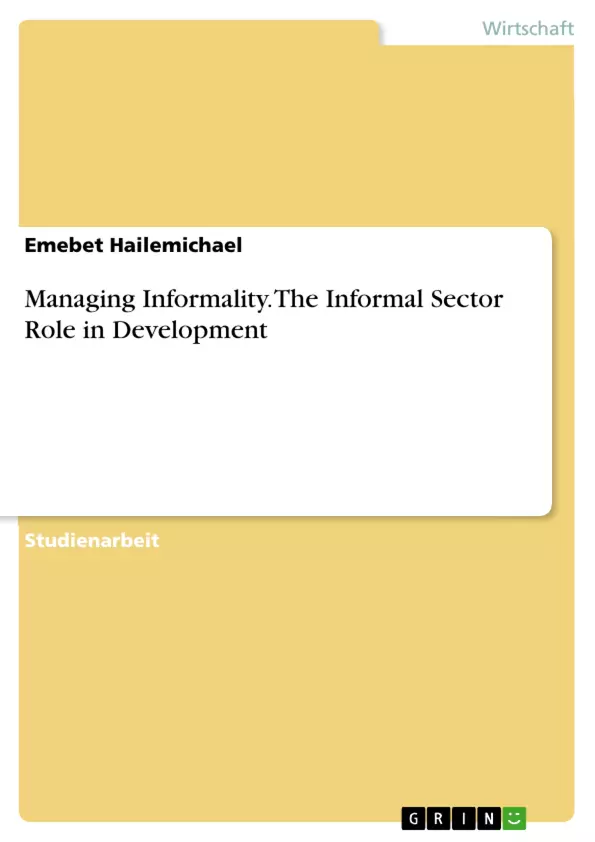The informal sector is defined as a sector which include all enterprises which are not officially regulated and which operate outside the incentive system offered by the state and its institutions. In contrast, enterprises which enjoy official recognition, protection and support are defined as formal sector. No such support or protection is available to informal sector enterprises.
At the empirical level, the informal sector is defined to comprise those economic enterprises which employ less than 10 persons (including the owner) per unit and which operate in open spaces; housed in a temporary or semi-permanent structure; does not operate from spaces assigned by government, municipality or private organizers of officially recognized marketplaces; it operates from residences or backyard; and it is not recognized.
Inhaltsverzeichnis
- Introduction
- The Role of Informal Sectors in Development
- Conclusion
Zielsetzung und Themenschwerpunkte
Dieser Text befasst sich mit der Rolle des informellen Sektors in der Entwicklung. Er untersucht die Ursprünge, Dynamiken und die Persistenz der informellen Wirtschaft, wobei die verschiedenen theoretischen Ansätze, insbesondere der strukturalistische Ansatz, beleuchtet werden. Der Text argumentiert, dass der informelle Sektor eine bedeutende Rolle bei der Schaffung von Beschäftigungsmöglichkeiten spielt, insbesondere für ländliche Migranten, die keine formellen Arbeitsplätze finden. Darüber hinaus werden die Verbindungen zwischen dem formellen und informellen Sektor untersucht, die sowohl Chancen als auch Herausforderungen für die wirtschaftliche Entwicklung schaffen.
- Die Bedeutung des informellen Sektors in der Entwicklung
- Theoretische Ansätze zur informellen Wirtschaft
- Verbindungen zwischen dem formellen und informellen Sektor
- Die Rolle des informellen Sektors bei der Schaffung von Beschäftigungsmöglichkeiten
- Die Auswirkungen des informellen Sektors auf die Einkommensverteilung und die Armutsbekämpfung
Zusammenfassung der Kapitel
Introduction
Die Einleitung definiert den informellen Sektor als einen Bereich wirtschaftlicher Aktivitäten, der nicht offiziell reguliert ist und außerhalb des staatlichen Anreizsystems operiert. Im Gegensatz dazu werden Unternehmen, die offizielle Anerkennung, Schutz und Unterstützung genießen, als formeller Sektor definiert. Der Text betont, dass Unternehmen im informellen Sektor keine solche Unterstützung oder Schutz erhalten und oft mit Schikanen konfrontiert sind.
The Role of Informal Sectors in Development
Dieses Kapitel untersucht die verschiedenen theoretischen Ansätze zur informellen Wirtschaft, wobei der Fokus auf dem strukturalistischen Ansatz liegt. Der Text argumentiert, dass der informelle Sektor eng mit dem formellen Sektor verbunden ist, da Unternehmen im formellen Sektor häufig informelle Arbeitskräfte oder Subunternehmer einsetzen. Diese Verbindungen schaffen Beschäftigungsmöglichkeiten, insbesondere für ländliche Migranten, und tragen zur Produktion und Verteilung von Waren und Dienstleistungen bei.
Schlüsselwörter
Informelle Wirtschaft, Entwicklung, Beschäftigung, Armut, formaler und informeller Sektor, Strukturalismus, ländliche Migration, Einkommensverteilung, Produktion, Verteilung.
Häufig gestellte Fragen
Was definiert den informellen Sektor laut diesem Text?
Der informelle Sektor umfasst alle Unternehmen, die nicht offiziell reguliert sind und außerhalb des staatlichen Anreizsystems operieren. Dazu gehören meist Betriebe mit weniger als 10 Personen, die oft in temporären Strukturen oder Wohnsitzen tätig sind.
Worin besteht der Hauptunterschied zwischen dem formellen und informellen Sektor?
Unternehmen im formellen Sektor genießen offizielle Anerkennung, Schutz und staatliche Unterstützung. Im informellen Sektor fehlen dieser Schutz und diese Unterstützung vollständig; stattdessen sind die Betriebe oft Schikanen ausgesetzt.
Welche Rolle spielt der informelle Sektor bei der wirtschaftlichen Entwicklung?
Er ist eine bedeutende Quelle für Beschäftigungsmöglichkeiten, insbesondere für ländliche Migranten, die im formellen Sektor keine Arbeit finden. Er trägt wesentlich zur Produktion und Verteilung von Waren bei.
Was besagt der strukturalistische Ansatz in Bezug auf die informelle Wirtschaft?
Dieser Ansatz argumentiert, dass der informelle Sektor eng mit dem formellen Sektor verknüpft ist, da formelle Unternehmen häufig informelle Arbeitskräfte oder Subunternehmer einsetzen, um Kosten zu sparen.
Welche Auswirkungen hat der informelle Sektor auf die Armutsbekämpfung?
Durch die Schaffung von Einkommensmöglichkeiten für benachteiligte Bevölkerungsgruppen spielt der Sektor eine zentrale Rolle bei der Armutsbekämpfung und der Einkommensverteilung in Entwicklungsländern.
- Citar trabajo
- Emebet Hailemichael (Autor), 2018, Managing Informality. The Informal Sector Role in Development, Múnich, GRIN Verlag, https://www.grin.com/document/595375



